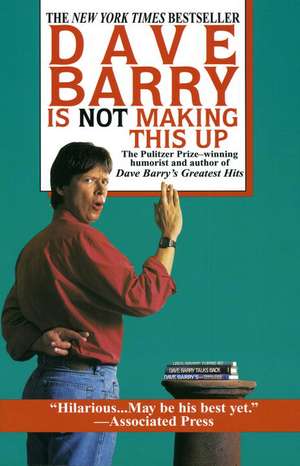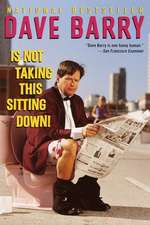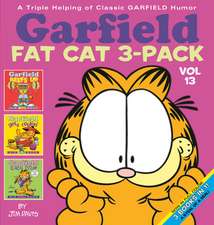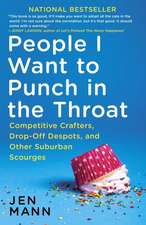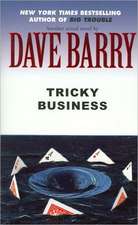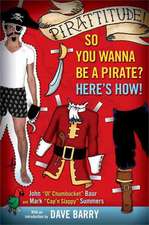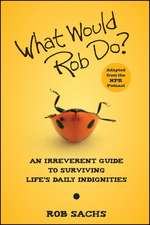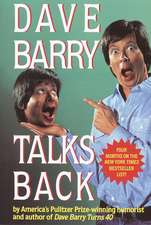Dave Barry Is Not Making This Up
Autor Dave Barry Ilustrat de Jeff MacNellyen Limba Engleză Paperback – 31 mar 1995
YOU CAN'T MAKE THIS STUFF UP
Dave Barry wouldn't lie--and here are the real life, laugh-out-loud stories from across America to prove it: a U.S. Supreme Court justice shares his remedy for preventing gas ("I had not realized that this was a matter of concern in the highest levels of government"); a newspaper headline in Ohio announces the combustibility of strawberry Pop-Tarts ("A story that can really help you gain a better understanding of how you can be killed by breakfast snack food"); a frightening fact that snakes have mastered the pipelines leading directly to your toilet--and they're not shy ("Many women might view this as a fair punishment for all the billions of times that guys have left the seat up").
Get up-close with Dave as he examines UFO thrillseekers and Elvis- worshippers, plays lead guitar with a horrifying rock band that includes Stephen King, and swears to tell the truth, the whole truth, and nothing but the truth...so God help you!
"BARRY IS AT HIS BEST."
--The Baltimore Sun
"HE ZAPS THE FUNNY BONE."
--The Cincinnati Post
Preț: 116.16 lei
Nou
Puncte Express: 174
Preț estimativ în valută:
22.23€ • 23.31$ • 18.50£
22.23€ • 23.31$ • 18.50£
Carte disponibilă
Livrare economică 11-25 martie
Preluare comenzi: 021 569.72.76
Specificații
ISBN-13: 9780449909737
ISBN-10: 0449909735
Pagini: 256
Dimensiuni: 136 x 210 x 18 mm
Greutate: 0.22 kg
Editura: BALLANTINE BOOKS
ISBN-10: 0449909735
Pagini: 256
Dimensiuni: 136 x 210 x 18 mm
Greutate: 0.22 kg
Editura: BALLANTINE BOOKS
Notă biografică
Dave Barry is a Pulitzer Prize-winning journalist for the Miami Herald. He is the author of numerous bestsellers, including Dave Barry Turns 50 and the novel, Big Trouble. He lives in Miami, Florida.
From the Paperback edition.
From the Paperback edition.
Extras
INTRODUCTION
People often say to me: "Dave, you are a leading journalism professional and not as short as I expected. What is your secret of success?"
The answer is that, throughout my career, I have always kept one vital journalistic principle foremost in my mind: Try not to leave the house. A journalist who leaves his or her house can run into all kinds of obstacles, including:
• Editors.
• Members of the public.
• News events involving actual facts.
All of these obstacles can seriously interfere with the basic work of journalism, which is sitting around and thinking stuff up. This is what I mainly do, which is why I have been able to achieve a level of high-quality journalistic productivity, as measured in booger jokes, that a guy like David Broder can only dream about.
Nevertheless, every now and then a situation will come up wherein a story of major importance is breaking somewhere other than in my office, and I have no choice but to go and cover it. For example, in this book you will find a column concerning an incident in 1992 when I left my house and traveled, without regard for my personal convenience or safety, all the way to my yard, to see the World's Fastest Lawn Mower. That's the kind of dedicated professional I am.
The result is that this book contains a number of columns based on real events. There are also some longer articles, most of which originally appeared in the Miami Herald's Sunday magazine, Tropic; these also contain an unusually high (for me) level of factual content. That's why this book is called Dave Barry Is Not Making This Up.*
I want to stress, however, that this title does not mean that this is a serious book. This book also contains a lot of "tongue-in-cheek" social commentary and satire, by which I mean lies. I hope you don't find this mixture of fact and fiction to be confusing. If, in reading the following pages, you are uncertain as to whether a specific statement is meant seriously or not, simply apply this rule of thumb: If the statement makes you consider filing a lawsuit, I was kidding. Ha ha!
* In an effort to boost up sales, we were going to call it Rush Limbaugh Is Not Making This Up, but there was some kind of legal problem.
READER ALERT
The following section, which is mostly about family stuff, contains the article that pretty much launched my writing career: the story of my son's "natural" birth. When I wrote it back in 1981, Beth and I were living in Glen Mills, Pennsylvania, and I had a job teaching effective business-writing seminars.* I wrote the article for the Philadelphia Inquirer, and it got reprinted in many other newspapers, including the Miami Herald, which ended up hiring me. So in a way you could say that I owe my job to my son. Although if you consider the amount of money I wound up spending just on He-Man action figures, I have more than paid him back.
* This could be why we got so far behind Japan. FOOD FOR THOUGHT
It's getting late on a school night, but I'm not letting my son go to bed yet, because there's serious work to be done.
"Robert!" I'm saying, in a firm voice. "Come to the kitchen right now and blow-dry the ant!"
We have a large ant, about the size of a mature raccoon, standing on our kitchen counter. In fact, it looks kind of like a raccoon, or possibly even a mutant lobster. We made the ant out of papier-mâché, a substance you create by mixing flour and water and newspapers together into a slimy goop that drips down and gets licked up by your dogs, who operate on the wise survival principle that you should immediately eat everything that falls onto the kitchen floor, because if it turns out not to be food, you can always throw it up later.
The ant, needless to say, is part of a Science Fair project. We need a big ant to illustrate an important scientific concept, the same concept that is illustrated by all Science Fair projects, namely: "Look! I did a Science Fair project!"
(I know how we can solve our national crisis in educational funding: Whenever the schools needed money, they could send a letter to all the parents saying: "Give us a contribution right now, or we're going to hold a Science Fair." They'd raise billions.)
Our Science Fair project is due tomorrow, but the ant is still wet, so we're using a hair dryer on it. Science Fair judges hate a wet ant. Another problem is that our ant is starting to sag, both in the front (or, in entomological terms, the "prognosis") and in the rear (or "butt"). It doesn't look like one of those alert, businesslike, "can-do" ants that you see striding briskly around. It looks depressed, like an ant that has just been informed that all 86,932 members of its immediate family were crushed while attempting to lift a Tootsie Roll.
While Robert is drying the ant, I get a flashlight and go outside to examine the experiment portion of our project, which is entitled "Ants and Junk Food." On our back fence we put up a banner that says, in eight-inch-high letters, welcome ants. Under this is a piece of cardboard with the following snack substances scientifically arranged on it: potato chips, a spicy beef stick, a doughnut, a Snickers candy bar, chocolate-filled cookies, Cheez Doodles, Cocoa Krispies, and Screaming Yellow Zonkers. If you were to eat this entire experiment, you would turn into a giant pimple and explode.
We figured this experiment would attract ants from as far away as Indonesia, and we'd note which junk foods they preferred, and this would prove our basic scientific point ("Look! I did a Science Fair project!"). Of course you veteran parents know what actually happened: The ants didn't show up. Nature has a strict rule against cooperating with Science Fair projects. This is why, when you go to a Science Fair, you see 200 projects designed to show you how an electrical circuit works, and not one of them can actually make the little bulb light up. If you had a project that was supposed to demonstrate the law of gravity using heavy lead weights, they would fall up. So when the ants saw our banner, they said: "Ah-hah! A Science Fair project! Time for us to act in a totally unnatural manner and stay away from the food!"
The irony is, I knew where some ants were: in my office. They live in one of the electrical outlets. I see them going in there all day long. I think maybe they're eating electrons, which makes me nervous. I seriously considered capturing one of the office ants and carrying it out to the science experiment, and if necessary giving it broad hints about what to do ("Yum! Snickers!"). But I was concerned that if I did this, the ants might become dependent on me, and every time they got hungry they'd crawl onto my desk and threaten to give me electrical stings if I didn't carry them to a snack.
Fortunately, some real outdoor ants finally discovered our experiment, and we were able to observe their behavior at close range. I had been led to believe, by countless public-television nature shows, that ants are very organized, with the colony divided into specialized jobs such as drones, workers, fighters, bakers, consultants, etc., all working together with high-efficiency precision. But the ants that showed up at our experiment were total morons. You'd watch one, and it would sprint up to a Cocoa Krispie, then stop suddenly, as if saying: "Yikes! Compared with me, this Cocoa Krispie is the size of a Buick!" Then it would sprint off in a random direction. Sometimes it would sprint back; sometimes it would sprint to another Cocoa Krispie and act surprised again. But it never seemed to do anything. There were thousands of ants behaving this way, and every single time two of them met, they'd both stop and exchange "high-fives" with their antennas, along with, I assume, some kind of ant pleasantries ("Hi Bob!" "No, I'm Bill!" "Sorry! You look just like Bob!"). This was repeated millions of times. I watched these ants for two days, and they accomplished nothing. It was exactly like high- way construction. It wouldn't have surprised me if some ants started waving orange flags to direct other insects around the area.
But at least there were ants, which meant we could do our project and get our results. I'd tell you what they were, but I really think you should do your own work. That's the whole point of a Science Fair, as I keep telling my son, who has gone to bed, leaving me to finish blow-drying the ant.
From the Paperback edition.
People often say to me: "Dave, you are a leading journalism professional and not as short as I expected. What is your secret of success?"
The answer is that, throughout my career, I have always kept one vital journalistic principle foremost in my mind: Try not to leave the house. A journalist who leaves his or her house can run into all kinds of obstacles, including:
• Editors.
• Members of the public.
• News events involving actual facts.
All of these obstacles can seriously interfere with the basic work of journalism, which is sitting around and thinking stuff up. This is what I mainly do, which is why I have been able to achieve a level of high-quality journalistic productivity, as measured in booger jokes, that a guy like David Broder can only dream about.
Nevertheless, every now and then a situation will come up wherein a story of major importance is breaking somewhere other than in my office, and I have no choice but to go and cover it. For example, in this book you will find a column concerning an incident in 1992 when I left my house and traveled, without regard for my personal convenience or safety, all the way to my yard, to see the World's Fastest Lawn Mower. That's the kind of dedicated professional I am.
The result is that this book contains a number of columns based on real events. There are also some longer articles, most of which originally appeared in the Miami Herald's Sunday magazine, Tropic; these also contain an unusually high (for me) level of factual content. That's why this book is called Dave Barry Is Not Making This Up.*
I want to stress, however, that this title does not mean that this is a serious book. This book also contains a lot of "tongue-in-cheek" social commentary and satire, by which I mean lies. I hope you don't find this mixture of fact and fiction to be confusing. If, in reading the following pages, you are uncertain as to whether a specific statement is meant seriously or not, simply apply this rule of thumb: If the statement makes you consider filing a lawsuit, I was kidding. Ha ha!
* In an effort to boost up sales, we were going to call it Rush Limbaugh Is Not Making This Up, but there was some kind of legal problem.
READER ALERT
The following section, which is mostly about family stuff, contains the article that pretty much launched my writing career: the story of my son's "natural" birth. When I wrote it back in 1981, Beth and I were living in Glen Mills, Pennsylvania, and I had a job teaching effective business-writing seminars.* I wrote the article for the Philadelphia Inquirer, and it got reprinted in many other newspapers, including the Miami Herald, which ended up hiring me. So in a way you could say that I owe my job to my son. Although if you consider the amount of money I wound up spending just on He-Man action figures, I have more than paid him back.
* This could be why we got so far behind Japan. FOOD FOR THOUGHT
It's getting late on a school night, but I'm not letting my son go to bed yet, because there's serious work to be done.
"Robert!" I'm saying, in a firm voice. "Come to the kitchen right now and blow-dry the ant!"
We have a large ant, about the size of a mature raccoon, standing on our kitchen counter. In fact, it looks kind of like a raccoon, or possibly even a mutant lobster. We made the ant out of papier-mâché, a substance you create by mixing flour and water and newspapers together into a slimy goop that drips down and gets licked up by your dogs, who operate on the wise survival principle that you should immediately eat everything that falls onto the kitchen floor, because if it turns out not to be food, you can always throw it up later.
The ant, needless to say, is part of a Science Fair project. We need a big ant to illustrate an important scientific concept, the same concept that is illustrated by all Science Fair projects, namely: "Look! I did a Science Fair project!"
(I know how we can solve our national crisis in educational funding: Whenever the schools needed money, they could send a letter to all the parents saying: "Give us a contribution right now, or we're going to hold a Science Fair." They'd raise billions.)
Our Science Fair project is due tomorrow, but the ant is still wet, so we're using a hair dryer on it. Science Fair judges hate a wet ant. Another problem is that our ant is starting to sag, both in the front (or, in entomological terms, the "prognosis") and in the rear (or "butt"). It doesn't look like one of those alert, businesslike, "can-do" ants that you see striding briskly around. It looks depressed, like an ant that has just been informed that all 86,932 members of its immediate family were crushed while attempting to lift a Tootsie Roll.
While Robert is drying the ant, I get a flashlight and go outside to examine the experiment portion of our project, which is entitled "Ants and Junk Food." On our back fence we put up a banner that says, in eight-inch-high letters, welcome ants. Under this is a piece of cardboard with the following snack substances scientifically arranged on it: potato chips, a spicy beef stick, a doughnut, a Snickers candy bar, chocolate-filled cookies, Cheez Doodles, Cocoa Krispies, and Screaming Yellow Zonkers. If you were to eat this entire experiment, you would turn into a giant pimple and explode.
We figured this experiment would attract ants from as far away as Indonesia, and we'd note which junk foods they preferred, and this would prove our basic scientific point ("Look! I did a Science Fair project!"). Of course you veteran parents know what actually happened: The ants didn't show up. Nature has a strict rule against cooperating with Science Fair projects. This is why, when you go to a Science Fair, you see 200 projects designed to show you how an electrical circuit works, and not one of them can actually make the little bulb light up. If you had a project that was supposed to demonstrate the law of gravity using heavy lead weights, they would fall up. So when the ants saw our banner, they said: "Ah-hah! A Science Fair project! Time for us to act in a totally unnatural manner and stay away from the food!"
The irony is, I knew where some ants were: in my office. They live in one of the electrical outlets. I see them going in there all day long. I think maybe they're eating electrons, which makes me nervous. I seriously considered capturing one of the office ants and carrying it out to the science experiment, and if necessary giving it broad hints about what to do ("Yum! Snickers!"). But I was concerned that if I did this, the ants might become dependent on me, and every time they got hungry they'd crawl onto my desk and threaten to give me electrical stings if I didn't carry them to a snack.
Fortunately, some real outdoor ants finally discovered our experiment, and we were able to observe their behavior at close range. I had been led to believe, by countless public-television nature shows, that ants are very organized, with the colony divided into specialized jobs such as drones, workers, fighters, bakers, consultants, etc., all working together with high-efficiency precision. But the ants that showed up at our experiment were total morons. You'd watch one, and it would sprint up to a Cocoa Krispie, then stop suddenly, as if saying: "Yikes! Compared with me, this Cocoa Krispie is the size of a Buick!" Then it would sprint off in a random direction. Sometimes it would sprint back; sometimes it would sprint to another Cocoa Krispie and act surprised again. But it never seemed to do anything. There were thousands of ants behaving this way, and every single time two of them met, they'd both stop and exchange "high-fives" with their antennas, along with, I assume, some kind of ant pleasantries ("Hi Bob!" "No, I'm Bill!" "Sorry! You look just like Bob!"). This was repeated millions of times. I watched these ants for two days, and they accomplished nothing. It was exactly like high- way construction. It wouldn't have surprised me if some ants started waving orange flags to direct other insects around the area.
But at least there were ants, which meant we could do our project and get our results. I'd tell you what they were, but I really think you should do your own work. That's the whole point of a Science Fair, as I keep telling my son, who has gone to bed, leaving me to finish blow-drying the ant.
From the Paperback edition.
Recenzii
"HILARIOUS . . . MIGHT BE HIS BEST YET."
--Associated Press
"BARRY AT HIS BEST."
--The Baltimore Sun
"HE ZAPS THE FUNNY BONE."
--The Cincinnati Post
From the Paperback edition.
--Associated Press
"BARRY AT HIS BEST."
--The Baltimore Sun
"HE ZAPS THE FUNNY BONE."
--The Cincinnati Post
From the Paperback edition.
Descriere
Bestselling author and Pulitzer Prize-winning columnist Dave Barry has been known to exaggerate in the line of duty. But when it comes to subjects in this latest collection of his classic columns, Barry's telling nothing but the truth. From toilet-dwelling snakes to combustible Pop Tarts, Dave presents just the facts.
